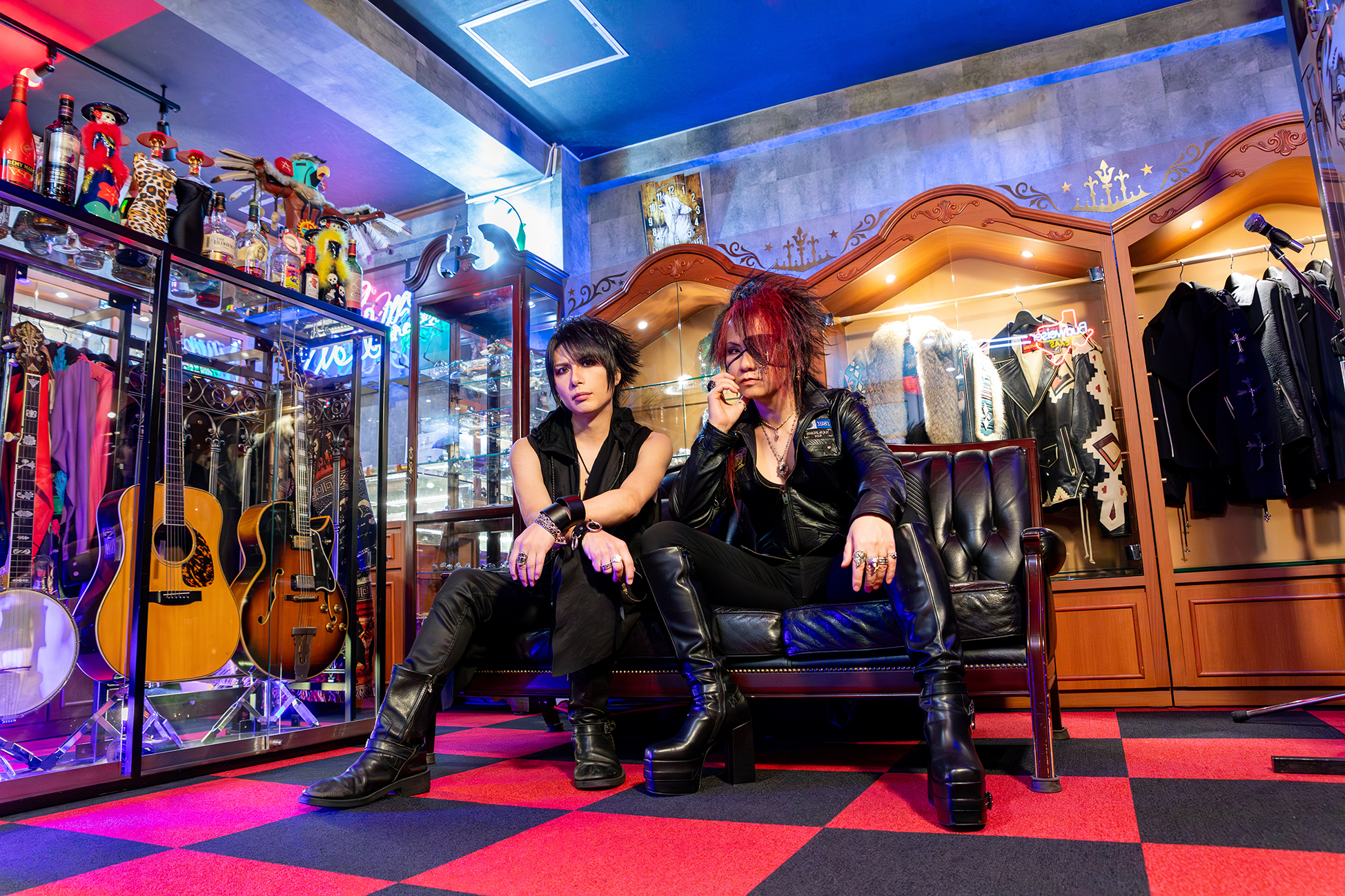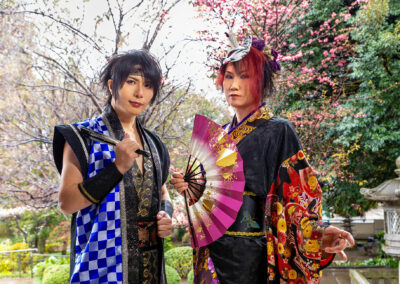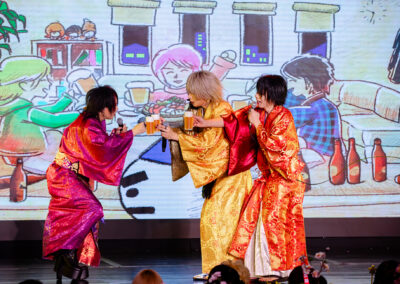Revealing alter-egos: TSUKASA & Seth’s metamophosis from Visual-Kei musicians to traditional Enka singers.
In the ever-evolving landscape of music, it’s quite usual for artists to venture into new genres and refine their artistry. Yet, it’s a rarity to encounter artists who make the leap from the intense, shadowy domain of heavy rock/industrial goth to the heartfelt, traditional sphere of Enka. Today, we present an exclusive interview with two such audacious artists who aren’t afraid to showcase the diverse aspects of their musical identities – Seth (Miyoshi Seiji) and TSUKASA (Mogamigawa Tsukasa). Both have carved successful paths in the Visual Kei/ J-Rock scene and have boldly ventured into the Enka genre.
Known in the Japanese music industry as Z, Seiji or Seth, this multifaceted artist has contributed his vocals to numerous esteemed bands. Since 2006, he has been the lead vocalist for Moi dix Mois and has also been associated with AFTER IMAGE, SHAPE SHIFTER and Art Cube. In 2018, he broadened his musical horizons by making his debut as an Enka singer under the alias Miyoshi Seiji. Since then, he has been prolific in his music production, releasing a series of singles
TSUKASA, famed for his role as the drummer of THE MICRO HEAD 4N’S and Luv PARADE, first rose to prominence as the former drummer of the popular band D’ESPAIRSRAY. Born and raised in the rural settings of Yamagata Prefecture, TSUKASA’s love for Enka music was instilled by his parents at a young age. In 2015, he officially entered the world of Enka singing, taking on the stage name Mogamigawa Tsukasa.

–– Can you share more about your transition from Visual-Kei to Enka?
TSUKASA: The trigger for my transition to Enka was when the band I was at the time, D’ESPAIRSRAY, disbanded. After that, I revisited a cherished childhood dream of becoming an Enka singer. I decided to give it a try on my own, but I faced quite a lot of setbacks along the way. That’s when I received an invitation to join a band called MICROHEAD4’S. When I mentioned that my childhood innermost dream was to become an Enka singer to the band’s leader, Kazuya, he suggested that I try both paths simultaneously. The transition has been challenging yet fulfilling. Balancing the two allows me to explore different aspects of my music and grow as an artist.
Seth: My decision to transition to Enka was deeply influenced by my father’s battle with illness, specifically cancer. During his rehabilitation, he would watch Moi Dix Mois’ DVDs and engage in exercises while listening to music. Despite not being a fan of rock music, my father had a strong affinity for Enka and Kayokyoku, traditional Japanese songs. Witnessing that, I thought I would explore the world of Enka further. Seeing the impact that music had on my father’s motivation and well-being, I felt compelled to create music that resonated with him. I believed that by singing songs that he enjoyed, I could uplift his spirits and provide a source of comfort during his challenging journey. This realization inspired my transition. I wanted to connect with my father on a deeper level through music.
–– What does your father think of your Enka music?
Seth: Actually, my father passed away before my debut.
–– I am deeply sorry.
Seth: Please don’t worry about it.
–– Your initial motivation was your father, but what is your current motivation that keeps you going?
Seth: Ultimately, there are people who supported me to make my debut, and I want to stay true to them. Also, even though my father passed away, my mother also loves Enka and Kayokyoku (ed. Japanese standard popular music). So, although my father battled cancer, both of my parents enjoy listening to Enka and popular songs. I want to bring joy to my mother. That’s where my motivation lies, I guess.
–– Very honorable.
TSUKASA, could you talk about your experience from drums to vocals and the challenges you encountered during this transition?
TSUKASA: Transitioning from drums to vocals was a significant shift for me as I had never been in the spotlight before. Overcoming my initial nervousness was a major hurdle that I had to face. It took time for me to adapt to leading a solo performance on stage, a role that I had never experienced before. These new challenges tested my abilities and pushed me out of my comfort zone. Even now, I continue to grapple with certain aspects, particularly in MC segments. But…The transition from drums to vocals offers me a valuable opportunity for personal growth and development. It allows me to enhance my musical skills, expressiveness and creativity, ultimately leading to a deeper level of self-expression.
–– For sure.
When you perform as a drummer in a rock band versus when you’re in the spotlight as a lead vocalist, do you experience any differences in terms of your stage presence or emotions?
TSUKASA: While my passion remains the same in both roles, the nature of the jobs and therefore the associated tension, pressure, varies. In the band, I have more responsibilities than just playing the drums, such as managing the computer and initiating the songs. The inability to afford mistakes brings a certain level of stress. I think being part of a band evokes a strong sense of responsibility towards the other members, which adds to the nervousness. On the other hand, when I perform Enka, it feels as if the entire audience is solely there for me, not that it’s always the case (laughs).
Seth: I’d say that’s accurate (laughs). It does feel that way when you’re singing Enka.
TSUKASA: Yes, there are times when I feel ecstatic. But, the tension is much higher when I’m on the drums. It’s a different kind of intensity. Singing Enka, in comparison, feels somewhat more relaxed than drumming.
Seth: As a solo act, if you make a mistake, it’s primarily you who bears the consequences. In a band, the pressure of not wanting to cause inconvenience to others. This is where the tension comes from.
TSUKASA: Thank you for this very accurate insight.
Seth: You’re welcome.
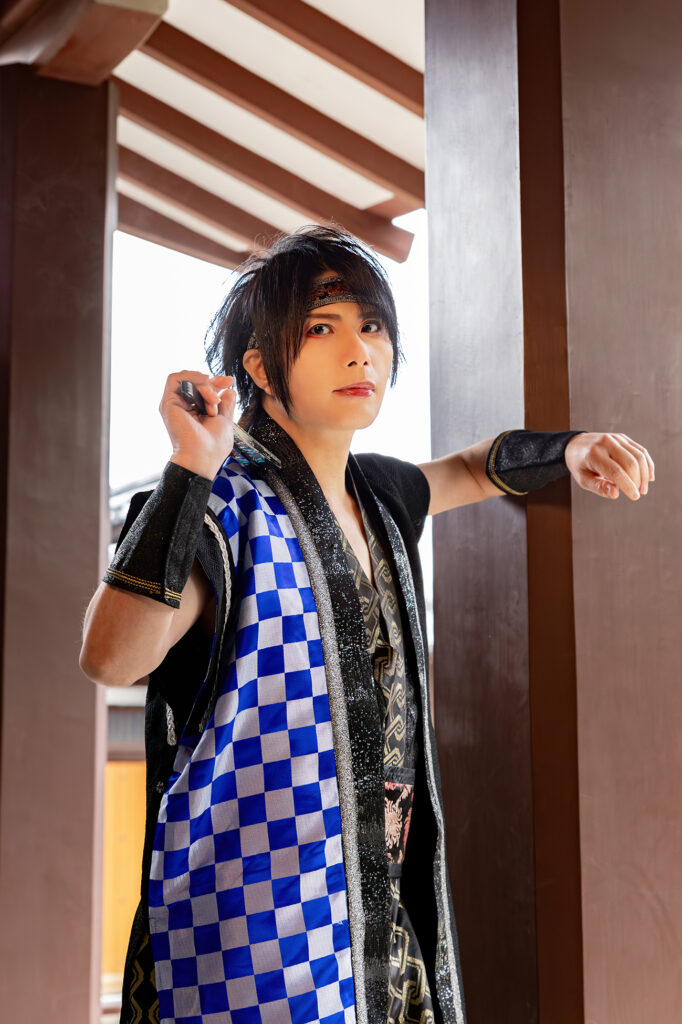
–– Seth, given your participation in a variety of bands, you’ve adopted numerous stage names. Is creating these alternate identities a necessary aspect for you, your art?
Seth: It was a requirement at certain points in my career. For instance, when I joined Moi Dix Mois, it was crucial that I wasn’t recognized, prompting me to change my name. I even used makeup to hide my tattoos, effectively altering my appearance to maintain anonymity. Later on, I took on the name Z, as continuing under my previous name wasn’t an option. We decided that each band member would use the initial of their first name. This decision was driven by the fact that despite having the same members as my previous band, we needed to present a drastically different world view. So, we all changed our names and launched without publicizing this change. That’s the story behind my adopting different names. Given that the band members remained the same and we were introducing new songs, we wanted to avoid carrying the previous band’s image. To shed that image, we decided to start afresh, promoting ourselves anew from the ground up.
––Are you, in a sense, acting, playing different characters?
Seth: I view myself as an actor in these circumstances. So, when I represent Miyoshi Seiji, I wholly embody that persona. Similarly, when I take on the role of Seth from Moi Dix Mois, I feel like I’m performing that character on stage. This was also the case when I was part of the band Art Cube, where I portrayed the band’s persona. I find it helpful to have a distinct name for each role, as it facilitates the transition between characters. Changing my name enables me to become the character fully. If everything was under one name, I likely wouldn’t have been able to perform as effectively.
–– So, who am I interviewing today (laughs)? Adopting different personas or identities allows you to explore various aspects of your creativity, providing new perspectives and fresh inspiration. TSUKASA, your name generally remains consistent across your different musical projects.
TSUKASA: Yes, it does. I borrowed the name Mogamigawa Tsukasa from a river in my hometown, Yamagata. While the pronunciation Tsukasa stays the same, there’s a distinction between the alphabetic and kanji versions in writing. I am using kanji for my Enka musical project as it appears more traditional.
Seth: But, your on-stage personas distinctly differ, isn’t that correct? The manner in which you express yourself while drumming in a band, compared to when you take on the role of Tsukasa, the Enka singer, is significantly different. It seems like the energy, the vibe, and even the aura you project vary considerably depending on the persona you’re embodying. From my perspective, they appear as unique, separate characters, each with their individual traits and nuances.
TSUKASA: Absolutely. When I reflect on my different personas, I find that I feel most at ease and true to myself when I step into the world of Enka performances. It’s as if the essence of who I am aligns perfectly with the emotions and expressions conveyed through Enka music. On the other hand, when I take on the role of a drummer, especially with bands like Luv PARADE or D’ESPAIRSRAY, I was initially advised not to speak during performances due to my distinctive Yamagata dialect (laughs). It often led to comical situations, as I tried my best to conceal my rural background and speak in a more neutral manner. Despite my efforts, my accent would occasionally slip through. When I’m with the band, I feel like I’m stepping into a character. While I still express my genuine emotions and let my true self shine through, I’m mindful of the image and reputation of the band. It’s a delicate balance between authenticity and maintaining the band’s identity.
Seth: So, in a way, you are intentionally creating a character. Would it be fair to say that you portray Tsukasa as a persona that harmonizes with the rest of the band?
TSUKASA: Absolutely. When I step onto the stage, I feel a heightened sense of responsibility to present myself in a way that aligns with the overall image and identity of the band. While I always strive to express my true self and convey genuine emotions through my performance, there is a level of conscious effort in shaping Tsukasa as a character that complements the collective energy and style of the band. It’s about finding that perfect balance between being authentic and contributing to the cohesive nature of the group’s dynamic.

–– That’s interesting, thank you for your insights.
What about the demographics of the audience? Is there any difference between the audiences for your Enka performances and your rock performances?
TSUKASA: Yes, there is definitely a distinction between the audiences for Enka and rock music. When I perform Enka, I tend to attract a more mature crowd, including elderly individuals, grandparents, who appreciate the traditional style and sentimental lyrics of the genre. It’s heartwarming to see their enthusiasm and connection to the music. But, that’s not to say that we don’t have fans of my rock bands who also attend these Enka performances. There is a diverse mix of age groups in the audience, ranging from older generations to younger individuals who have developed an appreciation for Enka. On the other hand, when it comes to rock concerts, the demographic shifts slightly. The fans are younger. Interestingly, there are occasions when fans of my Enka performances decide to venture into the world of rock and come to see me perform in that genre as well. But, we do have to be mindful of the fact that some older individuals may find the noise level and energetic atmosphere of a rock concert overwhelming. It’s wonderful to see the crossover of fans who appreciate both sides of my musical journey.
Seth: Same here. When I perform at dinner shows in my hometown of Hiroshima, the audience often comprises a majority of elderly people. Some of them initially got to know me through my Enka activity and have decided to attend Moi Dix Mois’ shows. On the contrary, some people who follow my rock activities, come to see my Enka performances. I find this incredibly gratifying. It’s heartening to see such diverse types of audiences showing interest in our music and performances. Their support is invaluable to us and it brings me great joy.
–– What are the main differences between Visual Kei/Rock music and Enka?
Seth: With Moi Dix Mois, our approach is predominantly shaped by Mana, who is the leader. He is responsible for composing the songs and penning the lyrics, and my work revolves around aligning with the universe that he envisions through his music. On the other hand, when it comes to Enka, I take on the role of lyricist for the most part. This gives me the freedom to shape the music in a way that fits the world I aspire to create through my words. With Moi Dix Mois, my objective is to bring to life the vision of the world that Mana wishes to portray. But, when I am alone doing Enka, I have the absolute freedom to express and follow through with my own ideas and vision. But that being said, I think the main divergence between Visual Kei/Rock and Enka lies in the visuals/ images and thematic focus. Visual Kei/Rock places a higher emphasis on the darker visual aspect and often deals with a broader range of themes in the lyrics. Enka is more focused on vocals and emotional storytelling, often dealing with more traditional and nostalgic themes.
TSUKASA: Same here. When I play with a band, I am dedicated to helping fulfill everyone’s expectations. When I sing Enka, I only think about my own expectation and vision.
–– If you were to encapsulate the essence of Enka in a single word, what would it be?
Seth: I would say romance, but more specifically, a forbidden type of love, adultery. The reason I gravitate towards such a theme is because it resonates with a significant demographic – many mothers globally who are drawn to daytime dramas that often center around these forbidden love narratives. I strive to sing songs that mirror the type of dramas older women enjoy, as they form a significant portion of our audience (laughs).
–– Do you think your Rock/Visual Kei background has had influence on your Enka activities?
TSUKASA: Miyoshi Seiji and I, along with Hanamizakura Kouki, who is also the vocalist of Visual Kei/Rock band, D=OUT, are perceived rather distinctly because of our background. We have formed an Enka band, MOGAMIZAKURAZENSEN. I see this as an opportunity to leverage this unique perception to bring about a transformation in the Enka and popular song industry. I carry this momentum into my lyric writing and musical arrangement. Together, we channel our collective efforts and ambition into reshaping the popular song industry.
–– There are performances scheduled next month (March)? What can we expect from this show?
Seth: It’s going to be a lively show designed to provide the audience with a comprehensive entertainment experience, not just limited to our singing.
TSUKASA: While we each have our individual solo projects, there are certain aspects that we can only bring to life when we come together as a band. This includes engaging in interactive performances.
Seth: Yeah, being a trio enables us to venture into areas like acting, where we can exchange dialogues, something that wouldn’t be possible if we were performing solo.
TSUKASA: We can even incorporate elements of humor into our act, playing off each other in a classic comedy duo.
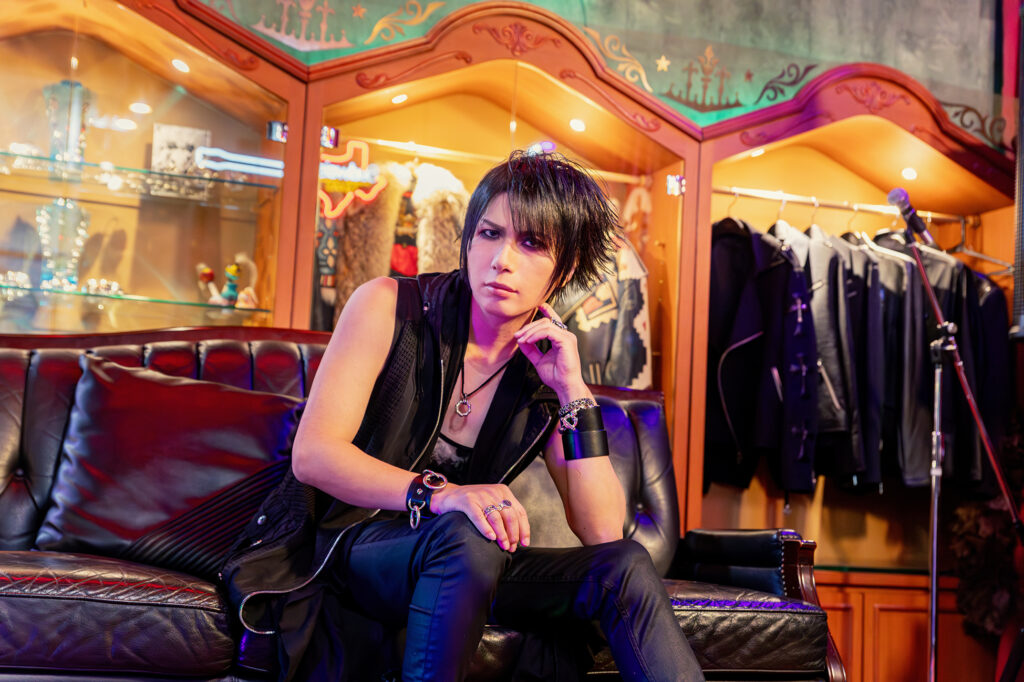
––What aspects of Enka music resonate with you the most?
TSUKASA: Enka, in comparison to genres like Pop or Rock, tends to have fewer lyrics. Yet, it’s remarkable how it clearly paints pictures and conveys messages despite its brevity. I think this distinctive quality, absent in other music genres, along with its quintessential Japanese essence, make up a world that I deeply appreciate. Even while I enjoy the unique universe created by rock music when I’m playing the drums, I must admit I’m rather ambitious in my musical tastes. I believe Miyoshi-san would agree.
Seth: Indeed, we dabble in both Rock and Enka as Tsukasa-kun mentioned. One of the most evident differences is that Enka tends to have a slower rhythm, making its melody more accessible to a broad demographic, from children to the elderly. I feel privileged to sing songs that have the potential to reach and be appreciated by such a diverse audience.
–– How do you go about preparing for an Enka performance, and how is it different from preparing for a rock performance?
TSUKASA: In terms of Enka, both Sei-chan and I strive to stand out as unique singers, so we aim to deliver performances that are not typical in the industry. We use a variety of elements such as visuals and sound effects in our preparation process. Even though I might not have abundant knowledge about other Enka singers, we’re determined to push the envelope and establish ourselves at the forefront of Enka entertainment. I may be exaggerating a bit, though (laughs).
Seth: I believe that’s a precise description (smiles).
TSUKASA: Regarding my drumming, specifically for Luv PARADE, we have had the privilege of covering a diverse range of renowned songs from around the world. This has enabled me to assimilate various skills. At present, we’re focused on creating our original songs and releasing music. I plan on continuing to learn from various covers in the future and incorporate those insights into our original music. Until you try it, you never realize the learning potential in it, like discovering new phrases! Hence, I find the activities of Luv PARADE to be quite educational, and I have a feeling they will be beneficial for my future progress.
Seth: About your initial question… With Moi Dix Mois, if I over-prepare, I risk straining my voice due to the abundant shouting involved. So, apart from the rehearsals with the band, I try to refrain from too much singing. When it comes to live performances, I find myself shouting for about 60% of time, which can be quite taxing on the throat.
TSUKASA: That’s something I’m not familiar with (laughs).
Seth: Given the amount of ARGH and GRRR shouting involved, I try to conserve my voice and avoid over-preparation. For Enka, my preparation involves singing. I prepare by practicing the songs since it doesn’t strain my throat (laughs).
–– Do you use anything like honey to soothe your throat?
Seth: I use a well-known Japanese lozenge called Ryukakusan (throat remedy), which I dissolve in water and then drink. If I were to continuously suck on the lozenge, my tongue would start to hurt, and I’d feel the urge to bite into it. So, making it into a drink makes it easier to consume.
–– Could you share some of your latest news?
TSUKASA: Personally, I don’t have any right now… I do wish to release a full-length CD soon though. Actually, with MOGAMIZAKURAZENSEN, we’ve written a new song that will be released in Autumn.
Seth: Yeah. Actually, we’ve already released a song/video as a band via YouTube, but we’ve done it with animation playing along. This time, we filmed ourselves for the first time to make a real music video. It will be announced during our live performance on March 9th so don’t spill the beans before the 9th (smiles).
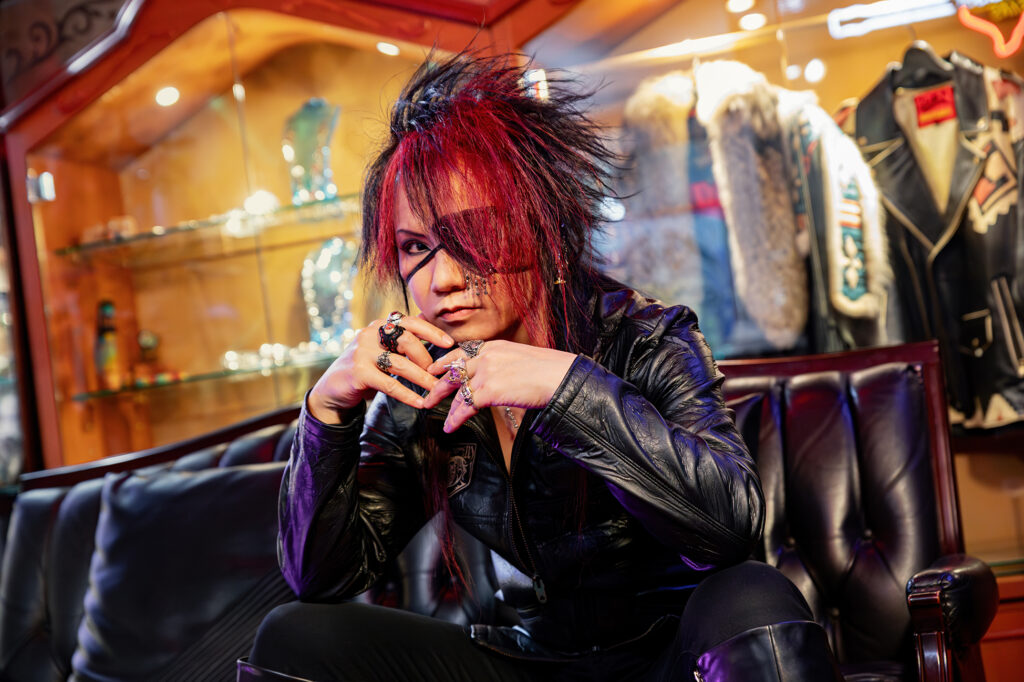
–– Lips are sealed. Thanks for the info.
To wrap up this interview on a fun note, let’s play a game Rock or Enka.
Seth: This is going to be… intense (laughs).
TSUKASA: Let’s play (laughs).
––When you’re in need of a mood booster, do you lean more towards Enka or Rock?
Seth: Rock.
TSUKASA: Rock.
––When you’re relaxing at home, do you prefer listening to Enka or Rock?
Seth: Enka.
TSUKASA: Enka.
––When you’re getting ready in the morning, do you play Enka or Rock?
Seth: Both.
TSUKASA: Enka.
Seth: This is hard. In the morning…
TSUKASA: It’s tough. I probably wouldn’t listen to intense rock first thing in the morning. But if it’s a rock ballad, I might listen to that. Enka has a morning atmosphere too, so I chose Enka.
––When you’re at a karaoke session, do you choose more Enka or Rock songs?
Seth: Enka.
TSUKASA: Enka. Before I made my debut, I used to go alone to practice.
Seth: So that was work, not private me-time.
––When you are commuting, do you listen to more Enka or Rock?
Seth: Both.
TSUKASA: Both. Actually, I listen to the songs I am writing, my demos.
Seth: If MDM is close, rock. If my Enka job is around the corner, I listen to Enka. I switch modes.
––When you’re in the waiting room, Enka or Rock?
Seth: Enka. Need some calm music…
TSUKASA: Enka… But I usually listen to the music I am working on at the moment.
––Before going to bed, Enka or Rock?
Seth: Both.
TSUKASA: Both.
––When driving, Enka or Rock?
Seth: Rock.
TSUKASA: Rock. Once, when I was driving while listening to Enka at full volume, I had to stop at a signal, I opened the window and the sound leaked out… I’m not really embarrassed because it’s a music genre I like singing, but I felt a bit strange being seen in public. Since then, I feel like I’ve listened to more Rock when I drive (laughs).
––Thank you both for this interview.
Seth: Thanks! That was fun.
TSUKASA: Thank you, for your time and interest.
__________________
Mandah FRÉNOT
(c) VMJ
> SEE MORE PHOTOS
Photography by Yoann CLOCHON

